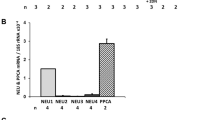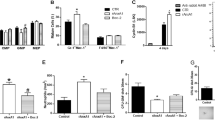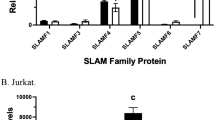Abstract
Human promyelocytic cells, NB4, differentiate into neutrophils in response to all-trans retinoic acid (ATRA). It has recently been proposed that NB4 cells have bilineage potential because these cells are also able to differentiate into mono- cyte/macrophages when exposed to a combination of 1,25-dihydroxyvitamin D3 (VD3) and phorbol myristate acetate (PMA). Differentiation of myeloid cells into neutrophils or monocytes is associated with the acquisition of the O-2 producing enzyme, NADPH oxidase, which plays a critical role in microbial killing. In this study, the expression of the components of the NADPH oxidase complex during the differentiation of NB4 cells into neutrophils or macrophages has been investigated. Whereas cells exposed to ATRA were able to produce O-2 after 2 days of differentiation, they remain unable to generate O-2 when exposed to PMA or PMA + VD3. With the exception of p21rac, none of the other oxidase components was expressed in non-differentiated cells. Addition of ATRA induced the progressive expression and accumulation of p22phox, p91phox, p47phox and p67phox. Compared to the other components, p67phox was expressed late and its expression appeared to correlate most closely with the generation of O-2 in the differentiation process. In PMA or PMA + VD3-differentiated NB4 cells, expression of the NADPH oxidase components was incomplete. Therefore, ATRA induced the expression of a functional NADPH oxidase complex in neutrophil-like NB4 cells. In contrast, when NB4 cells are exposed to monocytic differentiating agents, they acquire only part of the phenotypic characteristics of monocytes and lack one of the major phagocytic functionalities, the respiratory burst oxidase.
This is a preview of subscription content, access via your institution
Access options
Subscribe to this journal
Receive 12 print issues and online access
$259.00 per year
only $21.58 per issue
Buy this article
- Purchase on Springer Link
- Instant access to full article PDF
Prices may be subject to local taxes which are calculated during checkout
Similar content being viewed by others
Author information
Authors and Affiliations
Rights and permissions
About this article
Cite this article
N’Diaye, EN., Vaissiere, C., Gonzalez-Christen, J. et al. Expression of NADPH oxidase is induced by all-trans retinoic acid but not by phorbol myristate acetate and 1,25 dihydroxyvitamin D3 in the human promyelocytic cell line NB4. Leukemia 11, 2131–2136 (1997). https://doi.org/10.1038/sj.leu.2400855
Received:
Accepted:
Issue Date:
DOI: https://doi.org/10.1038/sj.leu.2400855



